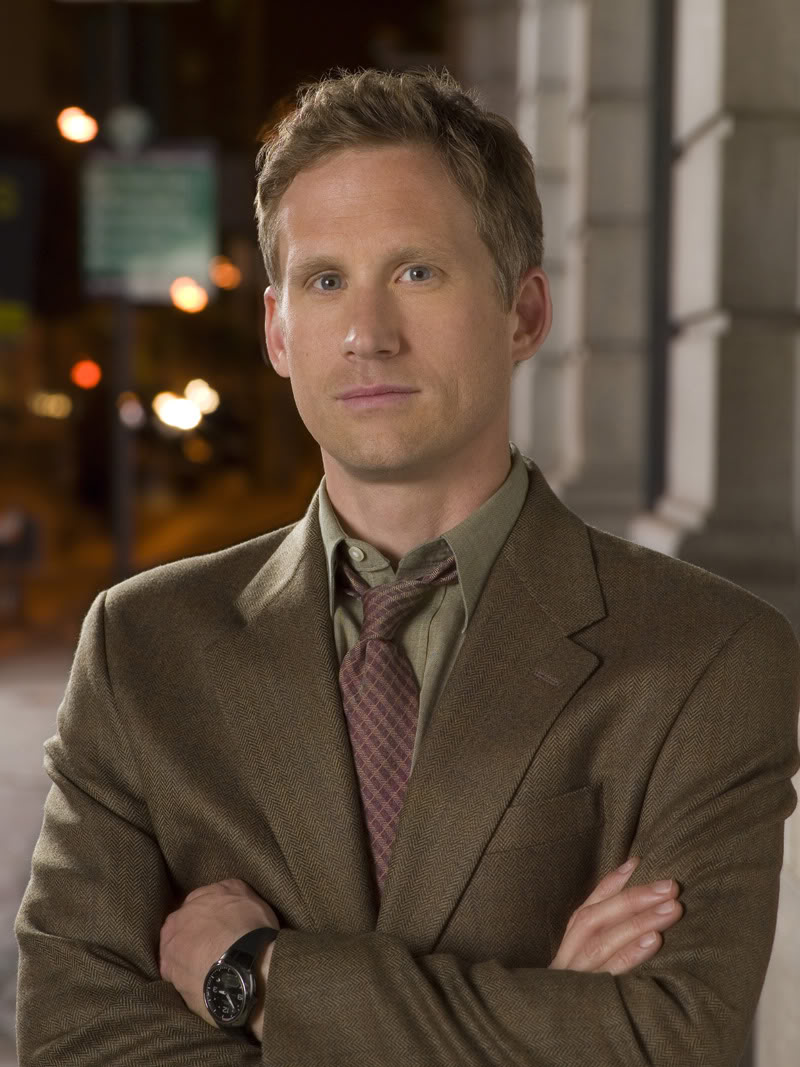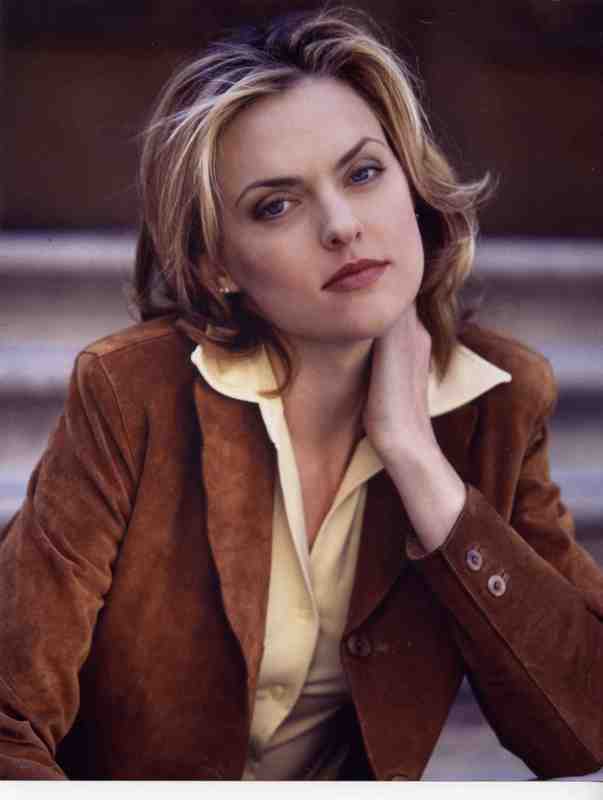Well, if today's crime dramas are formulaic, at least you can learn the formulas and amaze your friends by predicting what will happen next on the show. You could maybe even win a few bets. There are just a few rules, guidelines and conventions that go into today's formula, and I am willing to reveal them to you––as long as you don't come watch TV at my house.
Let's start with the most important thing: the whodunnit. When I say that today's crime dramas are just as formulaic as they ever were, I mean you can solve for X (the murderer) with a few simple rules. Heck, these rules are so simple you can even flowchart them if you are so inclined.
First of all, you need to understand that scripted TV cop/detective dramas are generally divided into three acts. The detectives usually have somebody they're focusing on in Act One, and another chief suspect in Act Two. Neither of these suspects will be the murderer. To be fair, I should say that there is a very occasional plot twist in which the Act One suspect––who will have been cleared of suspicion either during Act Two or by the end of Act One––will suddenly be revealed as the murderer in Act Three. This is like the Statue of Liberty play in football, though; meaning that this plot twist is only effective if used extremely rarely and judiciously.
 |
| The Prisoner's Patrick McGoohan played the killer four times on Columbo |
Next whodunnit rule: If one of the suspects is a super-rich captain of industry, that's your man––unless it's one of his kids or close associates. Assuming that there is no zillionaire character and there isn't a well-known guest star in the episode––or if there is but the guest star seems to have a lot of face time––then the general rule is that the murderer will turn out to be a character who is introduced in Act One but who is not a suspect. For example, this will usually be a witness interviewed by the detectives; somebody like a friend, co-worker or schoolmate of the victim, a relative of the victim's spouse. If you're watching a show, pay attention to these witness characters and amaze your friends by predicting the whodunnit before the end of Act One.
 |
| Reed Diamond |
 |
| Fred Koehler |
 |
| Elaine Hendrix |
Now that we've covered the basics of the whodunnit, we can talk about a few other conventions of crime drama. These don't lend themselves quite so well to impressing your friends, but you can still use them to make wise-guy remarks––and that's always a vital part of the TV-watching experience.
The first convention is the TV version of the Bond Girl rules, meaning that if one of the show's leads falls for a guest star, the guest star will be killed or victimized in some way. An exception to this convention is when the guest star turns out to be the murderer. To decide which it will be before Act Three, refer to the guest star whodunnit rule above.
 Our next convention concerns crime-detection technology. The police on TV have some amazing technology. Computerized whiteboards, huge touch screens with multiple displays that allow them to graphically represent all of the elements of the case, mind-boggling medical forensics tools and, my favorite, facial recognition software that instantly provides the ID of somebody caught on some grainy surveillance camera from a database of, apparently, everybody in the entire country. Half the technology on these shows doesn't even exist in real life, let alone in cash-strapped cop shops. The only vaguely realistic part of the whole cop/technology thing is that federal crime agencies seem to have much fancier technology than city police detectives.
Our next convention concerns crime-detection technology. The police on TV have some amazing technology. Computerized whiteboards, huge touch screens with multiple displays that allow them to graphically represent all of the elements of the case, mind-boggling medical forensics tools and, my favorite, facial recognition software that instantly provides the ID of somebody caught on some grainy surveillance camera from a database of, apparently, everybody in the entire country. Half the technology on these shows doesn't even exist in real life, let alone in cash-strapped cop shops. The only vaguely realistic part of the whole cop/technology thing is that federal crime agencies seem to have much fancier technology than city police detectives.Let's move outside. Out on the street, when the plainclothes detectives come upon a suspect, they always call out to him when they're far enough away that the suspect can run. This convention has been around since the start of TV crime drama. The idea seems to be that the show needs a little goosing up of the action, which is provided by alerting the suspect, so he and the cops can rush down streets and alleys, knocking down innocent civilians, vaulting over obstacles, crashing into vendor carts, climbing fences and so on, until finally reaching a dead end. (At which point we can go to commercial.)
How about a social convention? If organized crime is part of the plot, writers now seem to shy away from making the gangsters Italian or from any other ethnic group except the Russians and Irish. Yes, according to contemporary TV, pretty much all organized crime in contemporary American is run by those two groups.
It almost goes without saying that on TV crime drama, all criminal defense lawyers are jerks who treat cops with utter contempt. I don't even know why I bothered writing about this convention, since everybody already knows this one.
In modern TV crime drama, the protagonists are now required to have a dark back story. When the writers want to take a break from their flowcharts and prove that they have some serious dramatic chops, it's time for an episode that revisits the back story. This is why viewers occasionally have to suffer through the recurrent melodramatic story lines featuring the Red John story on The Mentalist or Beckett's mother's murder on Castle, for example.
You might ask why I watch TV crime dramas if I think they're so formulaic. It's like what William Hurt's coked-up character in The Big Chill says when he's watching old black-and-white B gangster movies in the middle of the night: "Sometimes you just have to let art flow over you."






Sister, it's been too long but youre still giving good advice. Who you RMD women backing on Sunday? Its SF by 7. Kev
ReplyDeleteHey Kev, it's been too long. Great to see you.
ReplyDeleteI'm hosting a Super Bowl party and my husband and I will be backing the 49ers. We lived in SF for 18 years and Steve Young is my all-time favorite football player.
Now that we're back in Maine, the Patriots are our team. I have a lot of respect for the Ravens, but cheering for them is pretty much out of the question.
I know Georgette will be cheering for the 49ers, but I'm not sure about the rest of the crew.
Sister Mary, I, too, enjoy letting art flow over me, and your pointers for watching TV crime will come in handy.
ReplyDeleteKev, glad you stopped by. As Sister Mary said, I'll be rooting for San Francisco, along with most of the other people at the Super Bowl party in Pismo Beach, California.
I have to pick a nit with the organized crime rule. It seems to me the majority of the tv show gangsters are no longer Russian but from some smaller eastern European country most golly shucks middle Americans can't point to on a map. Armenians, Ukrainians, and maybe a few of the -stans are the ones I hear most often. If the show is set in Boston the gangs are Irish 90% of the time though. Crossing Jordan and Rizzoli are both great examples of that. Sometimes seeing the formula can take the fun out of the show, but when the leads have great chemistry (Castle) it makes the show. Castle & Bones are also a great Do & Don't list of how to take the leads into a relationship. One is still firing on all cylinders while the other is falling to the bottom of my DVR priority list.
ReplyDeleteHi Rhiannon. You have a point that a lot of TV gangsters these days are -stans and from other former Soviet satellites.
DeleteThis new show, The Americans, is interesting. Its focus is a married suburban Washington DC couple who are actually KGB agents in deep cover. It's set in the early 1980s. It dovetails nicely with the audiobook I'm listening to, Robert Littell's The Company: A Novel of the CIA. I'm not sure, but I think you might like The Americans.
I don't know much about Bones. I've only watched it once in a great while because the forensic stuff is just too gross for me. I do like to watch whenever I hear Stephen Fry is going to be on, though. So you're saying the Bones/Booth relationship isn't being done well?
Morning, Rhi. I don't watch much TV, but recent crime novels feature a lot of organized crime headquartered in the Balkans, although the Russians seem to retain a lock on arms trafficking. If an author wants to send in a scary thug, he's often an Albanian. (Blood feuds, Enver Hoxha, alignment with Communist China rather than Russia during the Cold War.) I can't think of Albania without thinking of Nobel laureate Ismail Kadare, whose 2008 book, THE FALL OF THE STONE CITY, is finally available in English translation.
ReplyDeleteWe Americans are notoriously bad at world geography. Heck, many of us can't even locate our own states on a map and don't know their capitals. I've just been playing around with placing the states on an online map: http://www.yourchildlearns.com/mappuzzle/us-puzzle.html
Georgette, you should probably check out mental floss' website. There are lots of quizzes from politics to pop culture. My entire shop failed miserably at the name every POTUS in 8 minutes quiz. I just want to call you Georgie because I have been reading the Royal Spyness series from Rhys Bowen.
DeleteI was also wondering if anyone has applied the formula backward to say Ironside or the original Hawaii 5-0. I just watched the remake episode of Hawaii and now I am watching the original of the same episode on Netflix.
Rhi, I have no problem with Georgie.
DeleteI just checked out the Mental Floss website. A fun place for infomaniacs. Thanks for mentioning it.
My husband and I were so keyed up after the Super Bowl that we watched four old Perry Mason episodes, but we didn't think to try to apply the rules. I did notice that the last episode of ELEMENTARY fit in with the rules, though.
ReplyDeleteI'm going to check out Mental Floss. Sounds fun.
I called Georgette Georgina at first, so I don't think she'll be all that surprised to hear Georgie. How are the later books in the Her Royal Spyness series? I read the first couple.
Royal Spyness was quite good, I didn't care much for the rearrangement of the regular cast in NAUGHTY IN NICE, but she more than made up for it with a) Coco Channel, and b) the next book TWELVE CLUES OF CHRISTMAS.
ReplyDelete